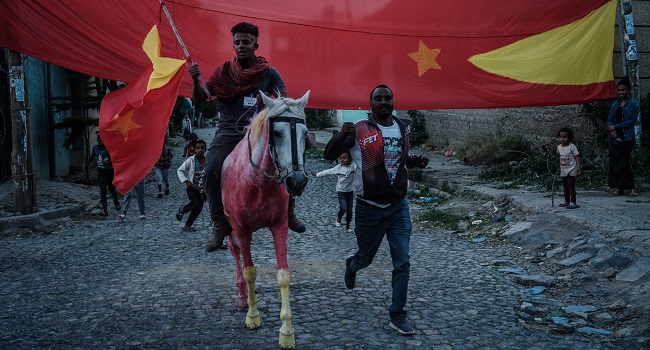
Rebels in Ethiopia’s war-torn northern region of Tigray have launched a new offensive, two weeks after Prime Minister Abiy Ahmed’s government declared a unilateral ceasefire in the eight-month-old conflict.
Here is a timeline of the fighting in Africa’s second-most populous country.
– Troops enter –
Fighting begins on November 4, 2020 when Abiy orders a military response to what he calls a “traitorous” attack on federal army camps in Tigray.
He blames it on the regional ruling Tigray People’s Liberation Front (TPLF), which dominated Ethiopian national politics for nearly three decades before Abiy took office in 2018.
The TPLF denies responsibility and says the reported attack is a pretext for an “invasion”.
Two days later, with fighting intensifying, Abiy sacks the head of the military, whose top brass includes many battle-hardened Tigrayans.
On November 9 Ethiopia carries out more air strikes in Tigray with Abiy saying the operation will be over “soon”.
Tens of thousands of refugees flee to neighbouring Sudan as the African Union follows the United Nations in demanding an end to the fighting.
– ‘War crimes’ –
After 10 days of fighting, the UN warns of possible war crimes in Tigray.
Neighbouring Eritrea — with which Abiy signed a peace deal in 2018 that helped him win the Nobel Peace Prize — sends troops into Tigray to help Abiy, although their presence is denied by Addis Ababa.
– Capital falls –
Two weeks later, having rejected peace talks, Abiy says government tanks are advancing on Tigray’s capital Mekele.
The city comes under heavy shelling on November 28 before Abiy announces military operations in Tigray are “completed”.
– ‘Ethnic cleansing’ –
In February 2021 Amnesty International says Eritrean soldiers killed “hundreds of civilians” in November in the holy city of Axum.
The following month AFP documents another massacre by the troops in Dengolat.
US Secretary of State Antony Blinken later urges Eritrea to withdraw and describes violence in western Tigray as “ethnic cleansing”.
– Atrocities admitted –
For months Ethiopia and Eritrea flatly deny the involvement of Eritrean forces in the conflict.
But on March 23 Abiy admits Eritrean troops had crossed into Tigray. He also suggests they may have been involved in atrocities.
The next day the Ethiopian Human Rights Commission says Eritrean soldiers massacred more than 100 civilians in Axum.
– Withdrawal? –
Abiy flies to Asmara to meet President Isaias Afwerki and says Eritrea has agreed to pull its forces out.
About a week later Ethiopia says Eritrean troops have “started to evacuate” Tigray, but on April 15 the UN says there is no evidence of withdrawal.
– 4 million face food crisis –
As international outrage mounts, AFP obtains government documents showing that Eritrean troops are looting and blocking food aid.
US President Joe Biden in late May calls for a ceasefire and says rights abuses “must end”.
In June the World Food Programme says four million people face a food crisis in Tigray, including 350,000 risking famine.
– UN ‘deeply disturbed’ –
The UN High Commissioner for Human Rights Michelle Bachelet says on June 21 she is “deeply disturbed” by reports of “serious violations” in Tigray and that she has “credible reports” Eritrean soldiers are still operating in the region.
Elections are held across much of Ethiopia that day but not in Tigray.
– Deadly market air strike –
At least 64 people are killed and 180 injured in an Ethiopian air strike on a market in Togoga on June 22, according to a local health officer.
The attack was aimed at rebel fighters, Ethiopia’s military insists.
The UN calls for an urgent investigation.
Medical charity Medecins Sans Frontieres says on June 25 that one Spanish and two Ethiopian employees have been murdered in Tigray.
– Rebel advance, govt ceasefire –
Tigray’s interim government flees on June 28 in the face of a rebel advance on Mekele, signalling a turning point in the conflict.
The federal government announces a “unilateral ceasefire”. The rebels accept it “in principle” while vowing to fight on if strict conditions are not met.
– New assault –
Tigrayan forces say on July 13 they have pushed south and recaptured the town of Alamata, staging similar offensives in western Tigray.
The attacks come barely two days after election results showed Abiy’s party had won in a landmark parliamentary poll, guaranteeing him a new five-year term.




